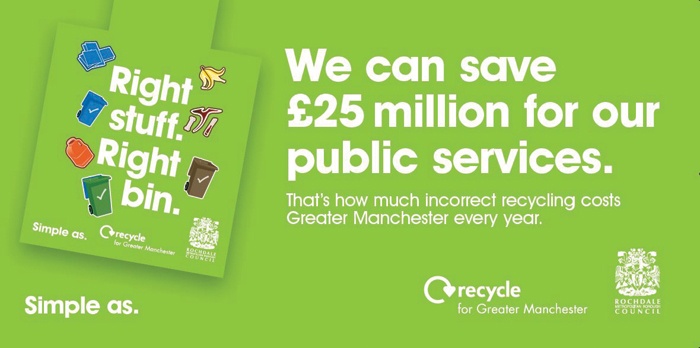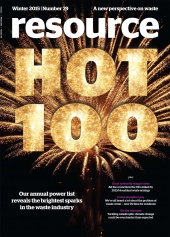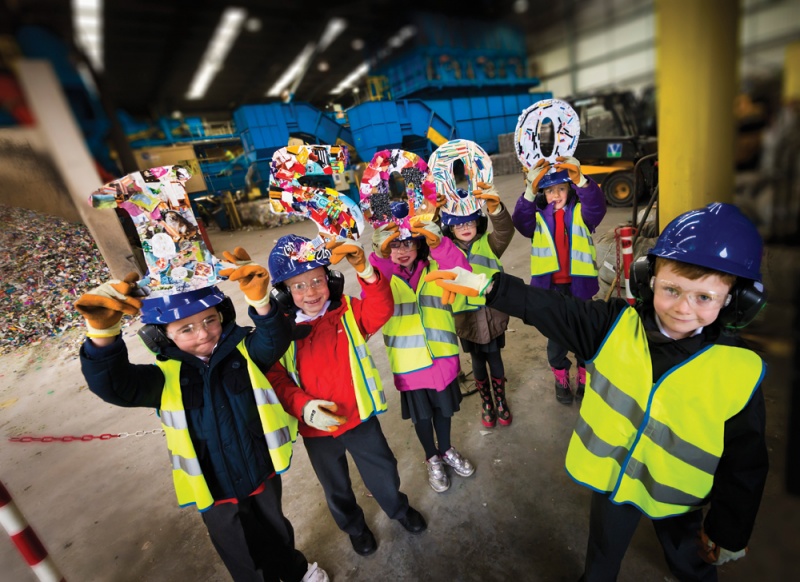Greater communication

In April 2009, England’s largest waste disposal authority, Greater Manchester Waste Disposal Authority (GMWDA), signed a £3.8-billion, 25-year recycling and waste contract with Viridor Laing (Greater Manchester) Limited (VLGM), a partnership between Viridor and John Laing plc. The contract sees VLGM treat waste (1.1 million tonnes in 2012/13) from across nine areas: Bolton; Bury; Manchester; Oldham; Rochdale; Salford; Stockport; Tameside; and Trafford.
Communicating the changes taking place in Greater Manchester – including waste service changes and the building of 42 new facilities – to the 1,009,815 households was part of the contract, as VLGM’s Communications Manager Karen Hall, explains: “Five years of a Viridor-Laing communications team was built into the contract, as people need constant reminders of what to do with their recyclables, especially when a new system comes into play.”
Six years on, and now on a rolling contract based on performance, the seven-strong communications team is still very much embedded at GMWDA. Held together under the ‘Recycle for Greater Manchester’ banner, it’s a complicated structure, but Hall says it works: “Because VL are the contractors and Viridor are the operators, we’ve got an established network
there within the industry. And because we work closely with the Viridor comms team, we share best practice. That is one of the key things that VL has got going on: We’ve got influence on that contractor and we can all work in partnership.”
She adds: “Because we are a separate team, we devise an agreed plan where expectations are defined in advance and that leads to a light-touch approach from GMWDA, which allows us to have a really good client-contractor relationship. As well as this, we work closely with the nine districts. They still run their own communication activities and teams; however, we support them where possible with the Recycle for Greater Manchester plan and brand.”
What’s more, because Recycle for Greater Manchester has joint funding from the partnership, there is a dedicated pool of money for activities that individual councils might not have funding for – they plan to run 32 this year. The latest is the ‘Right stuff. Right bin.’ targeted communications campaign within seven low-performing areas. “As part of the campaign, we knock on people’s doors, we leaflet, we hold events, we advertise and we then tag the bins”, Hall explains. Residents get a ‘Right stuff. Right bin.’ tag if they’ve put the correct materials in and a ‘Wrong stuff. Wrong bin.’ tag if there’s contamination (a lot of the confusion revolves around plastics, says Hall).
Householders who are door-knocked after a ‘Wrong stuff.’ tag are given the chance there and then to remove contaminating materials and have their recyclables collected that day, rather than being left for another week.
 This article was taken from Issue 79
This article was taken from Issue 79“One of the key things we’ve done with ‘Right stuff. Right bin.’ is that we looked at a message that would resonate with the public and affect the public directly, and one of the things we put out there was that if everyone recycled right and we didn’t have contamination and rejected loads, we would save £25 million for public services across greater Manchester.”

The pilot that was run in Rochdale in 2013 achieved a 61 per cent reduction in contamination in the co-mingled bin, as well as a 49 per cent increase in co-mingled recycling and a seven per cent increase for paper and card. It also delivered over £20,000 in disposal cost savings.
VLGM also runs four education centres in Greater Manchester, with two full-time education officers who educate schools and community groups about the 3Rs. “A lot of the time it’s just about dispelling myths and engaging with people: telling them about the materials they could recycle”, notes Hall. That clearly goes for Manchester’s young and old alike. 





